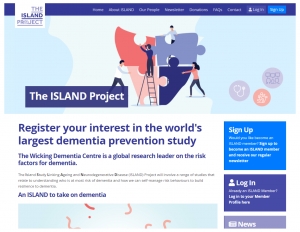
Welcome to this edition of the ISLAND Project Newsletter, where we will explore diet as a risk factor for dementia further. I’m Edward Hill, a Postdoctoral Research Fellow at the Wicking Dementia Research and Education Centre and an associate investigator on the ISLAND Project. I’ve been fascinated with the potential of modifiable lifestyle risk factors to mitigate an individual’s risk for neurodegenerative diseases of ageing. This led to my Honours project at the University of Melbourne - Royal Melbourne Hospital, where I looked into the relationship between adherence to a Mediterranean-style Diet and the deposition of one of the hallmark proteins in Alzheimer’s disease: beta-amyloid. This research formed the foundations of my PhD, investigating several dietary patterns and their association with beta-amyloid in the brain of older Australian women. The following article explains this research further and I hope you find it informative. I’ve always been intrigued by clinical, epidemiological methods and public health approaches to dementia risk reduction, spurring on my involvement with the ISLAND project. With the ISLAND project, I’ve been assisting with the design and development of online cognitive testing, which ISLAND members will soon be provided the opportunity to participate in. The ISLAND cognitive testing platform will be delivered entirely online from the comfort of your own home. As the Research Fellow for the Tasmanian Healthy Brain Project (THBP), I’ve also been involved with the design and deployment of the ISLAND Campus Project. With evidence from the THBP that later-life education might provide some resilience against age-related cognitive decline, the ISLAND Campus Project is an exciting initiative from the Wicking Centre and UTAS, enabling Tasmanians over 50 years of age to enrol in fee-free university level education. Thank you for your participation in our research. Without you, researchers like me cannot progress our aim to reduce the incidence of dementia in our community.
|

We know dementia is the second leading cause of death in Australia, and the leading cause of death for Australian women. Alzheimer’s disease is the leading cause of dementia, accounting for 60-70% of all cases. As a disease that disproportionately affects women more than men, research into modifiable risk factors for dementia in women is of great importance. Results from previous literature reviews indicate diet is associated with the incidence and prevalence of Alzheimer’s disease, however very little research has been conducted into the abnormal biological changes that precede the onset of clinical symptoms, such as memory loss. Through a review of existing research, we were the first researchers to provide support that diet was not only related to the clinical signs of Alzheimer’s disease, but also to the abnormal biomarkers that precede disease onset. Of note was the association between a high-glycaemic, Mediterranean and ‘Alzheimer’s protective’ dietary patterns and biomarkers of this disease. In several studies, a high-glycaemic, high-saturated fat diet was associated with an increase in biomarker burden, and therefore an increase in risk for Alzheimer’s disease and dementia. Consistently, a Mediterranean or ‘Alzheimer’s protective’ dietary pattern (characterised by higher intake of fresh fruit and vegetables, whole grains, fish and low-fat dairies; and a lower intake of sweets, fried potatoes, high fat dairies, processed meat and butter) was associated with a reduction in biomarker burden. This provided further support for a biological foundation for the diet-dementia relationship we have observed in epidemiological research. Following on from this review, our group investigated dietary patterns that were associated with brain levels of beta-amyloid in older Australian women. Utilising data collected from the longitudinal Women’s Healthy Ageing Project, we extrapolated dietary patterns and energy intake from women and identified four dietary patterns: Mediterranean, junk food, low fat and high fat. We found that women who adhered to the junk food dietary pattern (characterised by high consumption of takeaway foods, added sugar, confectionary) had the highest amount of beta-amyloid in their brains, and further to this, that adherence to the junk food pattern was a significant predictor of brain levels of beta-amyloid. . We now know that diet displays strong potential for reducing an individual’s dementia risk. Dietary patterns are related to the biomarkers that precede clinical symptoms of dementia, however we still do not know the underlying processes that govern this relationship. Moving forward, the Wicking Research and Dementia Centre is in a strong position to answer these questions.
|

Not yet an ISLAND member?
If you haven't signed up to our research program, it's easy and takes just a few minutes. Our website, ISLAND Home, is where you will find access to our research surveys and activities, including ISLAND Campus. By becoming an ISLAND member you will be kept updated with information and opportunities to help you reduce your risk of developing dementia and to be part of our combined efforts to reduce the incidence of dementia in Tasmania. Go to our website and sign up, or if you have enrolled in any of our MOOC's, go to the log in link and sign in with your existing credentials.
|